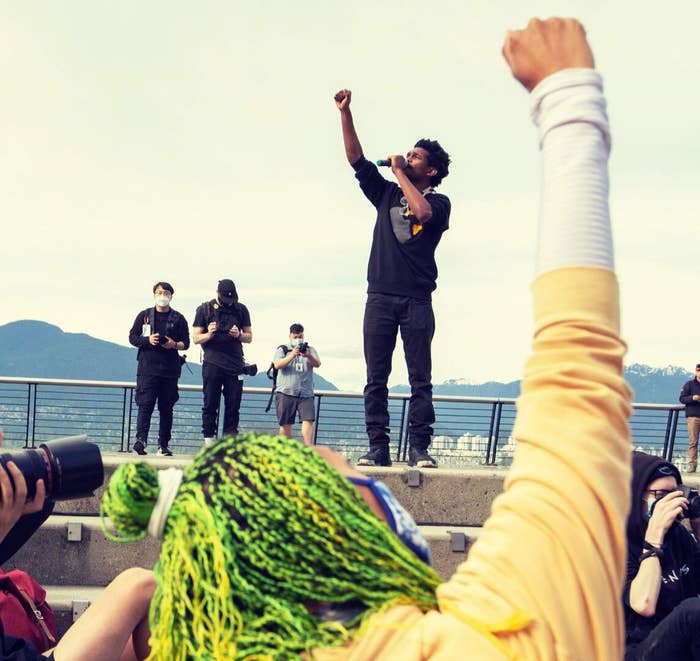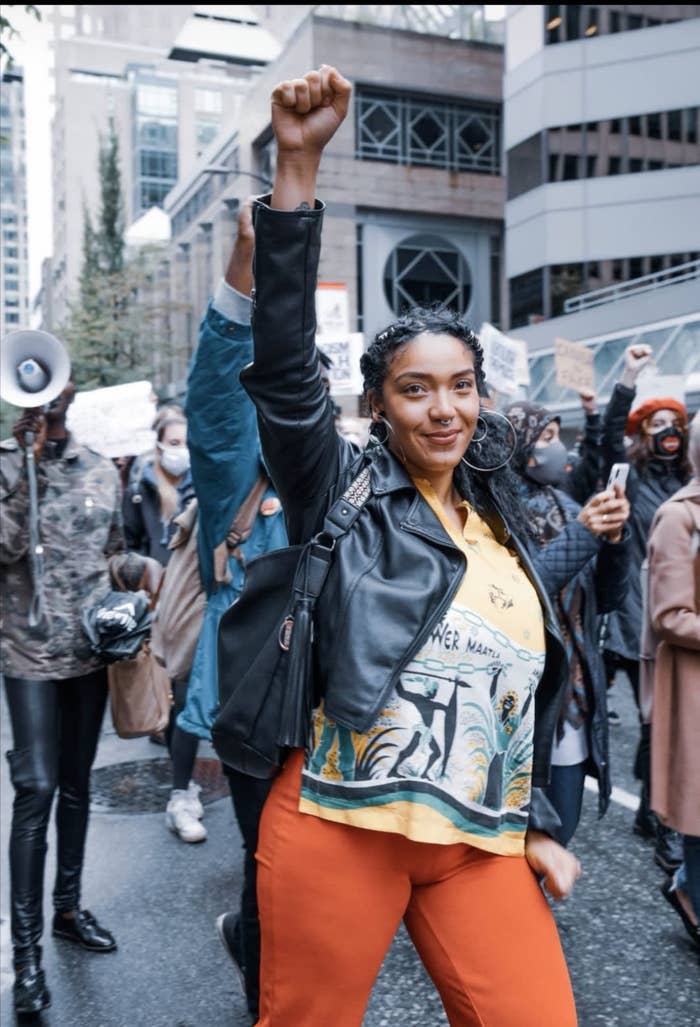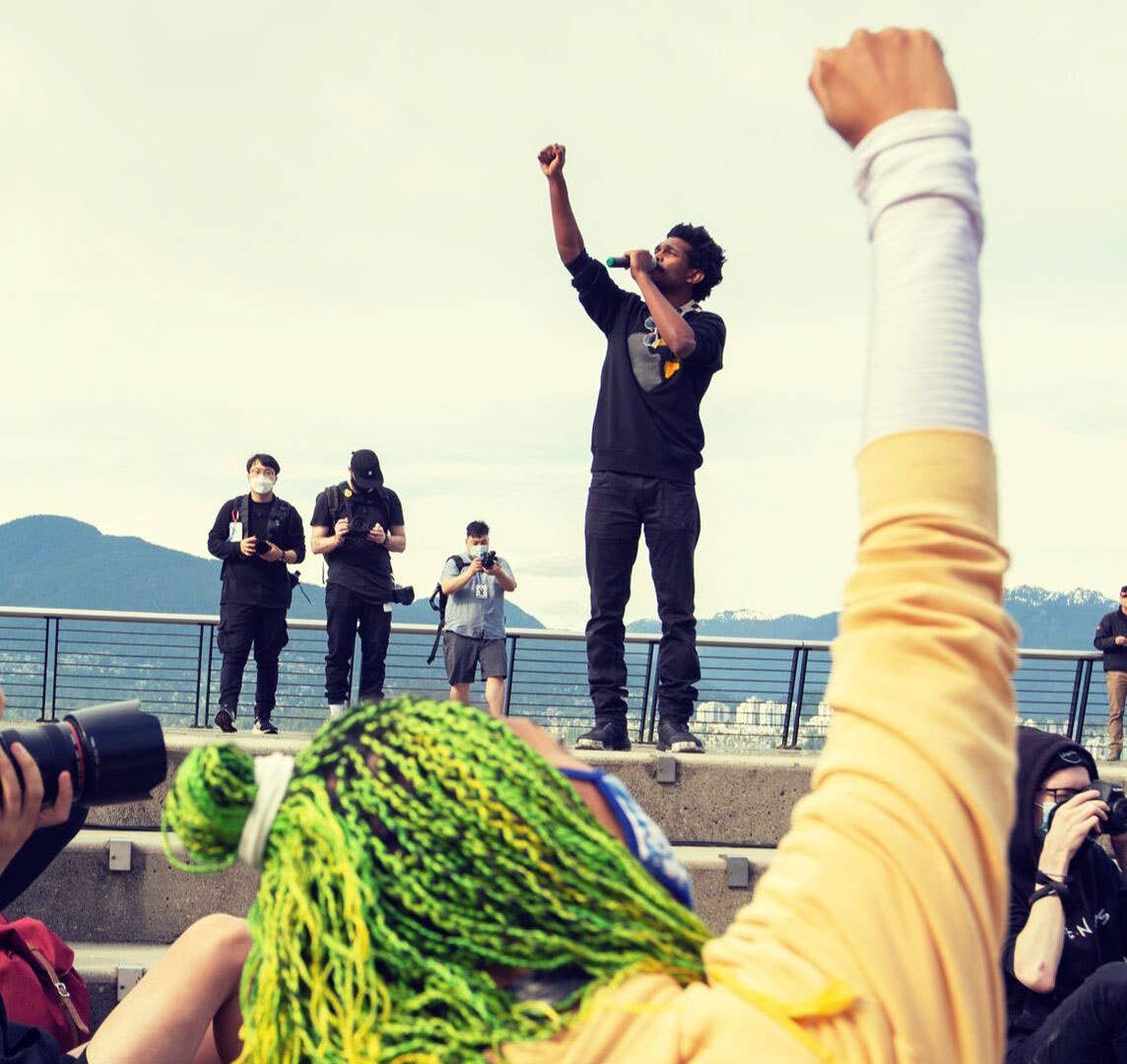
During the summer of 2020, in the midst of heightened media awareness of the continued racial brutality BIPOC people face across North America, the Anti-Racism Coalition of Vancouver (ARC) banded together. Family members Steve, Dehara, and Xhalida September, and friend Regina Abernathy came together to organize an effort to combat the racism they were seeing and experiencing in Vancouver. The Anti-Racism Coalition of Vancouver has since been making active changes for racialized communities in the city, with hopes to expand throughout Canada. Upon an analysis of anti-racism organizations in British Columbia, the ARC realized they could act as a cohesive force to work with other bodies and facilitate more changes both systematically and socially.
Over the last year, the ARC has held a number of events and created safe spaces in Vancouver for the BIPOC community, while promoting mental health and overall well-being. They’ve actively remained on scene to spread anti-racism awareness, and are also working toward making legislative changes to ensure equality and protection for marginalized communities. The ARC has been invited to speak in classrooms, and hosted a number of fundraisers to raise funds for local organizations like The WISH Drop-in Centre and Downtown Eastside Women’s Centre.
In addition to amplifying Orange Shirt Day, the ARC started Black Shirt Day, a day meant to recognize the struggles that Black and racialized Canadians face on a daily basis. They hope to use the initiative to push for more Black history in the B.C. school curriculum, and are working towards getting the Ministry of Education to officially proclaim January 15 Black Shirt Day.
They’ve also stood with Cancel Canada Day, a movement that speaks to the injustices that Indigenous communities have faced at the hands of the Canadian government. This year, the ARC will be hosting a Juneteenth march in Vancouver.
Complex caught up with the three founding members of the Anti-Racism Coalition of Vancouver—Regina Abernathy, Steve September and Dehara September—to discuss the coalition, and their hope to shape a better Canada.
Since June 2020, you’ve all been actively working to create tangible change for racialized people in Vancouver. What inspired you all to begin the coalition together?
Regina Abernathy: On June 5, 2020, I was at a protest in Vancouver down by the Olympic cauldron shortly after George Floyd’s death. I distinctly remember Dehara and myself embracing each other with tears streaming down our faces thinking that holding up signs, and shouting out statements like “enough is enough” just wasn’t enough. I wanted to be a part of the change, and not just talk about it, but actively be about it and that’s when I decided to join ARC Vancouver, the second meeting in.
Steve September: I saw the need to be a catalyst for groups and many individuals who wanted to do something about the reality of racist attacks on all of us. There was outrage, but not enough organization to be effective. Once the public saw ARC, we started getting contacted by many different groups and entities, teachers and students initially. Soon professional organizations also started to contact ARC; Black Physicians of BC, sports organizations and personalities, unions and trade unionists, musicians and artists.
Dehara September: I echo Regina’s sentiments. June was a catalyst for me. The protest put a fire in my belly. After having a conversation with my sister and dad after the protest, we decided to get organized, mobilize, and reach out to the people we knew were in the same mindspace and eager to do work.
How can organizing and spreading awareness bring about long-lasting change?
Regina: A continued approach to education, internally (our members) and externally, bringing the contradictions of the general society and laying them bare at people’s feet to make the conclusions. Also, there is strength in numbers and the more people get to see that even with their slight differences, there is a bigger force that leads to peace and freedom.

What are some of the definite changes the coalition works towards?
Regina: ARC contacts many organizations across North America to get a more complete picture of the many levels of struggle that are occurring. We don’t have to invent the wheel as many other anti-racism and pro-equality have existed for some time and can show us the way to tackle certain issues. Therefore we are working towards unity in actions, thoughts, programs, and with many BIPOC groups.
Steve: The coalition strives to end all forms of racial inequity through education, legislation and social events. Quite naturally, due to COVID, social events have been limited and we’ve had to resort to virtual options. For example, the UNIDERD symposium, which is still currently available to view on ARC’s website. However, our goal moving forward is to plan more social events once things start to open up more.
How can others get involved with ARC?
Steve: Join an ARC general meeting and see if/where you can contribute to a working group committee and join as a member or volunteer. Follow ARC on social media platforms including our website to stay updated as to what we’re actively doing. Sign the Black Shirt Day petition, and donations are greatly appreciated.
Tell me more about your initiative, Black Shirt Day.
Steve: It’s a day in which we recognize the ongoing struggles that Black and racialized Canadian face on a daily basis, and it’s a day of continued education in the schools to help combat racism. Also, it’s a positive initiative and great addition leading up to Black History Month. Our hope is to have BSD celebrated in all schools across Canada every second Friday in January going forward. We are currently working with the Ministry of Education (Jennifer Whiteside and the education team) to have this date become a proclamation.
What are some other projects and initiatives that ARC is working toward?
Steve: Cancel Canada Day (July 1, 2021). ARC stands in solidarity with this movement. The purpose of the movement is to bring about awareness of the injustices that the Indigenous communities have endured and continue to endure. We recognize that it should be a day in which we show respect and celebrate the original people.
Regina: We plan to continue developing connections with many organizations, and in different cities. Some of these organizations include trade unions, Black Physicians of BC, the College of Physicians and Surgeons (CPSBC), and sports organizations whose members are BIPOC and who are also facing issues of neglect, ostracization, overpassing, minimizing—especially qualified women—and delay tactics. The list continues to grow.
What inspired the Juneteenth march in Vancouver?
Steve: The heart-wrenching death of George Floyd was definitely a catalyst for waking up the BIPOC community. It set the tone for the necessary protests and the Juneteenth march, seeing as Juneteenth is a holiday commemorating the end of slavery in the United States.
Juneteenth is the oldest nationally recognized commemoration of the ending of slavery in the United States. Juneteenth celebrations and demonstrations in America, and around the world, recognize African-American freedom and achievement. ARC’s Juneteenth march aims to celebrate Black history, while also fighting toward more development in communities across North America for Black people.
The ARC’s Juneteenth march takes place June 19th, at 12 p.m. PDT at the Vancouver Art Gallery.

